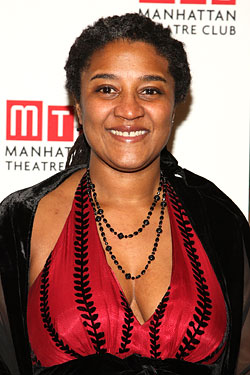
Lynn Nottage, winner of the 2009 Pulitzer for her play, Ruined, is frustrated. She says she has a question for the universe: ÔÇ£Why can this play sweep all the awards and be as popular as it has been ÔÇö it was extended seven times ÔÇö and still not find its way to Broadway?ÔÇØ she asked during a recent phone conversation. Nottage has her own theory: ÔÇ£I think gender and race play a large part.ÔÇØ The same riddle is teased out regularly in the conference rooms, caf├®s, and town-hall gatherings of American theater: Why are the majority of plays produced written by men? Why do even the most talented female playwrights seem to have a hard time making their way to Broadway? Artistic directors say they tend to receive more scripts from male playwrights. Yet female playwrights say they submit work frequently and itÔÇÖs often neglected.
So whoÔÇÖs right? Maybe everybody, according to a study released today, ÔÇ£Opening the Curtain on Playwright Gender,ÔÇØ by Princeton graduate Emily Glassberg Sands. (Sands will present her findings tonight in a town-hall gathering for members of the industry at 59E59 Theaters.) SandsÔÇÖs senior thesis shows that female playwrights are, in fact, discriminated against, which may be one reason why fewer women are writing plays.
Sands, who was just scooped up by Harvard for a Ph.D, is no ordinary undergrad scholar. Her mentors include Freakonomics author Steven Levitt; Cecilia Rouse, an Obama appointee to the Council of Economic Advisers; and Alan Krueger, Treasury Secretary Tim GeithnerÔÇÖs second-in-command for economic policy. ÔÇ£[Sands] provides convincing evidence that female playwrights are not being treated equally,ÔÇØ says Rouse, who also found gender bias in the selection of musicians by orchestras in her own groundbreaking 1997 study. ÔÇ£It suggests this sector is not as productive as it might be and the right plays arenÔÇÖt getting to audiences.ÔÇØ
In three separate studies ÔÇö which Rouse calls a ÔÇ£triple playÔÇØ ÔÇö across 170 pages, Sands finds gender bias on the part of both men and women in script selection and production, and shows that it hurts theaters economically.
Her first analysis, derived from crunching data about plays and playwrights from the website doollee.com, reveals that women tend to write plays about women, but plays featuring female protagonists are produced less often than those starring men. And, while the proportion of scripts that get produced is fairly equal between men and women, the total number of productions is inequitable since fewer women write plays (one informal study of nonprofit theaters by the playwright Julia Jordan found that 17 percent of their plays were written by women). One way women have compensated for writing female stories is to write fewer roles, which make their plays accessible to more theaters.
Sands also sent out four previously unseen scripts by prominent female playwrights ÔÇö Lynn Nottage, Julia Jordan, Tanya Barfield, and Deb Laufer ÔÇö to artistic directors and literary managers nationwide. Each script was assigned two pen names, like Mary Walker and Michael Walker. The results were surprising: Female readers rated scripts with female pen names 15 percent lower than those with male pen names, while male readers rated the scripts equally. Sands attributes this to women thinking that womenÔÇÖs plays ÔÇ£will be less well received.ÔÇØ
But this doesnÔÇÖt mean men are exonerated from bias. Sands also used box-office grosses for Broadway plays over the last decade to measure economic success and audience appeal. Women represented 60 to 70 percent of ticket buyers, and plays written by women sold almost one quarter more tickets per week than those by men, earning 18 percent higher grosses weekly. Yet even though plays written by men tend to earn less, they ran about the same amount of time as those by women. ÔÇ£Because female-written plays have to have wider audience appeal, that proves discrimination against female playwrights both in the decision of which plays to select for production and how long to keep those shows in production,ÔÇØ Sands said in an interview.
No wonder, then, that fewer women write plays than men. Sands doesnÔÇÖt go so far as to offer a solution to this chicken-and-egg problem, but perhaps her finding that womenÔÇÖs plays make more money will encourage artistic directors to produce them more often.
Casey Childs, executive director of Off BroadwayÔÇÖs Primary Stages, whose three plays this season are all by women, is eager to see SandsÔÇÖs results. ÔÇ£This study will probably change the way we read scripts,ÔÇØ he says. ÔÇ£There are probably things we should be doing because weÔÇÖre in the Dark Ages.ÔÇØ
Artistic Director Oskar Eustis says he has not seen bias at his Public Theater, but is open to considering affirmative action: ÔÇ£Somebody call a meeting, letÔÇÖs talk about it.ÔÇØ

